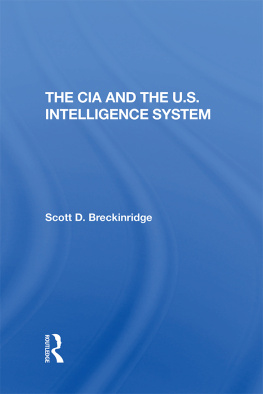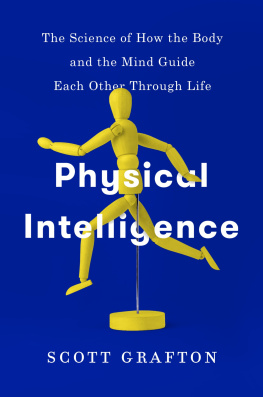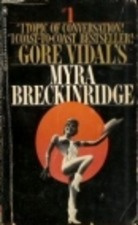THE CIA AND THE U.S. INTELLIGENCE SYSTEM
Westview Library of Federal Departments, Agencies, and Systems
Ernest S. Griffith and Hugh L. Elsbree, General Editors
The Library of Congress, Second Edition, Charles A. Goodrum and Helen W. Dalrymple
The National Park Service, William C. Everhart
The Forest Service , Second Edition, Michael Frome
The Smithsonian Institution, Second Edition, Paul H. Oehser; Louise Heskett, Research Associate
The Bureau of Indian Affairs, Theodore W. Taylor
The United States Fish and Wildlife Service, Nathaniel P. Reed and Dennis Drabelle
The CIA and the U.S. Intelligence System, Scott D. Breckinridge
The Foreign Service of the United States: First Line of Defense, Andrew L. Steigman
Available in hardcover and paperback.
About the Book and Author
Foreign policyincluding economic policy and national security policyand the appropriate planning, decisionmaking, and execution of that policy depend upon foreign intelligence, which must be collected on a global scale, checked, compared, sifted, analyzed, and coordinated. The collection, analysis, and delivery of this body of information requires a multilevel, multiagency governmental system.
Our understanding of the national intelligence system is often incomplete. This book by former CIA veteran Scott Breckinridge explains the complexities of the system, with a concentration on the National Security Council (the system's center) and the Central Intelligence Agency (its main coordinating instrument and also a principal collection arm). Mr. Breckinridge reviews the origin and development of modern intelligence systems with special emphasis on the U.S. establishment. He analyzes the main fields of intelligence and the characteristics of special intelligence sectors, the reasons for their existence, and their missions, targets, and problems. Particular attention is given to the vexing dilemma of overt versus covert activities, the sharp differentiation between the basic mission of intelligence collection and the CIA's additional, massive task of actively influencing conditions abroad. The author also deals with the dramatic changes in intelligence gathering and analysis that have resulted from the accelerating evolution of technical surveillance equipment. Finally, he discusses the status of intelligence under U.S. and international law and the principles and standards of conduct to be observed by those engaged in intelligence work.
Scott D. Breckinridge served with the CIA for more than twentysix years, both overseas and in Washington. For three years, he was the agency's briefing officer for the White House staff. He represented the agency before the 1975-1976 congressional investigating committees. He also served as liaison officer with the intelligence organizations of an allied nation and coordinated assignments with other units or committees of the government's intelligence community. His last sixteen years were spent with the CIA's Inspector General's detachment, with six as the Deputy Inspector General. Mr. Breckinridge was twice awarded the CIA's Distinguished Intelligence Medal, the agency's highest award.
The CIA and the U.S. Intelligence System
Scott D. Breckinridge
First published 1986 by Westview Press, Inc.
Published 2019 by Routledge
52 Vanderbilt Avenue, New York, NY 10017
2 Park Square, Milton Park, Abingdon, Oxon OX14 4RN
Routledge is an imprint of the Taylor & Francis Group, an informa business
Copyright 1986 Taylor & Francis
All rights reserved. No part of this book may be reprinted or reproduced or utilised in any form or by any electronic, mechanical, or other means, now known or hereafter invented, including photocopying and recording, or in any information storage or retrieval system, without permission in writing from the publishers.
Notice:
Product or corporate names may be trademarks or registered trademarks, and are used only for identification and explanation without intent to infringe.
Library of Congress Cataloging-in-Publication Data
Breckinridge, Scott D.
The CIA and the U.S. intelligence system.
(Westview library of federal departments, agencies, and systems)
Bibliography: p.
Includes index.
1. United States. Central Intelligence Agency.
2. Intelligence serviceUnited States. I. Title.
II. Title: CIA and the United States intelligence
system. III. Series.
JK468.I6B74 1986 327.1'2'0973 85-20377
ISBN 13: 978-0-367-29087-0 (hbk)
This book is dedicated to six unusual men former Inspectors General of the Central Intelligence Agencywhose unpublicized achievements should stand as a guiding beacon for all public servants:
Lyman B. Kirkpatrick
John S. Earman
Gordon M. Stewart
William V. Broe
Donald F. Chamberlain
John H. Waller
Theirs was the mission to find the truth and advance its cause. They did.
- Figures
- CIA headquarters building in Washington, D.C
- Tables
The genesis of this book lies in a course on U.S. intelligence in support of national policy, which was taught by the author for the Department of Political Science at the University of Kentucky. No single book covered all the points and issues that seemed appropriate to that course, although authors with experience in the field had written valuable books on some aspects of intelligence. A number of people without direct experience or knowledge also had written on that subject, but much of this literature suffered from both limited experience and a negative bias that often distorted the facts and sometimes concealed the complexity of the issues.
The initial plan of this book was to provide a descriptive and explanatory review of the major intelligence activities of the government. That is an ambitious undertaking in itself, as the government's intelligence organizations are numerous and their interrelationships complex. Beyond that, many of the issues raised about intelligence in the mid-1970s remain alive and had to be addressed. Finally, it was important that the book be a single volume of manageable size, which demanded a difficult balance between detail and summary.
The author's background for undertaking such a book derives from over twenty-six years with CIA, both in Washington and overseas. The last sixteen years were spent in the Office of the Inspector General, and in the last six of those, the author served as Deputy Inspector General. The assignments provided a unique exposure to the range of activities in CIA, as well as recurring contact with other government agencies in the United States and abroad. The perspectives and insights gained from this experience were augmented by considerable involvement with the investigative groups of the mid-1970s. This experience, combined with the writing of others known to the author and details in reports of the investigating bodies, has provided the basis for the present work.
There is considerable erroneous writing about intelligence, but one directly familiar with its actual nature can pick a way through most of the myths and legends that have been created and produce a reasonably reliable and authoritative manuscript. This cannot be done with total certainty, however, as some facts are beyond recapture, differing individual perceptions result in varying recollections and descriptions, and summaries sometimes omit details that people think important.











